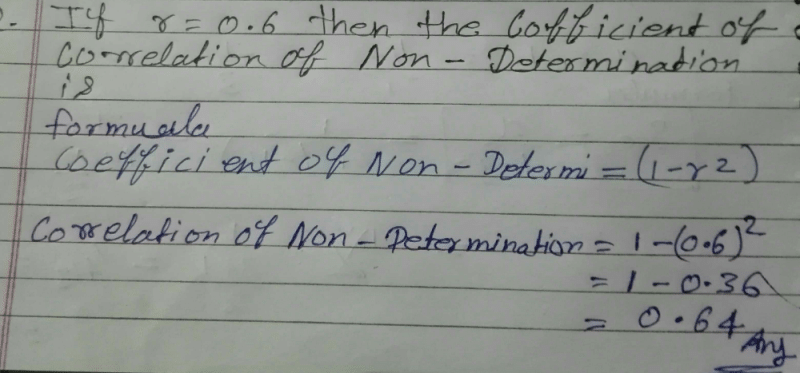CA Foundation Exam > CA Foundation Questions > If r=0.6 then the cofficient of correlation o...
Start Learning for Free
If r=0.6 then the cofficient of correlation of non-determination is a)0.4 B)-0.6 c)0.36 d) 0.64 Answer is option(d). Why?
Most Upvoted Answer
If r=0.6 then the cofficient of correlation of non-determination is a)...
The coefficient of correlation of non-determination, also known as the coefficient of non-determination or the coefficient of alienation, is a measure of the proportion of the total variability in a dataset that is not explained by the correlation between the variables. It is calculated as the square of the correlation coefficient (r) subtracted from 1.
Formula: Coefficient of non-determination = 1 - r²
Given that r=0.6, we can calculate the coefficient of non-determination as follows:
Coefficient of non-determination = 1 - r²
= 1 - (0.6)²
= 1 - 0.36
= 0.64
Therefore, the answer is option (d), 0.64.
Explanation:
When r=0.6, it means that there is a positive correlation between the variables, but not a perfect one. The coefficient of non-determination tells us how much of the variability in the data cannot be explained by this correlation. In this case, the coefficient of non-determination is 0.64, which means that 64% of the variability in the data is not explained by the correlation between the variables. This could be due to other factors that are not included in the analysis or measurement error.
In summary, the coefficient of non-determination is a useful measure for understanding the limitations of the correlation coefficient and the extent to which it can explain the variability in the data.
Formula: Coefficient of non-determination = 1 - r²
Given that r=0.6, we can calculate the coefficient of non-determination as follows:
Coefficient of non-determination = 1 - r²
= 1 - (0.6)²
= 1 - 0.36
= 0.64
Therefore, the answer is option (d), 0.64.
Explanation:
When r=0.6, it means that there is a positive correlation between the variables, but not a perfect one. The coefficient of non-determination tells us how much of the variability in the data cannot be explained by this correlation. In this case, the coefficient of non-determination is 0.64, which means that 64% of the variability in the data is not explained by the correlation between the variables. This could be due to other factors that are not included in the analysis or measurement error.
In summary, the coefficient of non-determination is a useful measure for understanding the limitations of the correlation coefficient and the extent to which it can explain the variability in the data.
Community Answer
If r=0.6 then the cofficient of correlation of non-determination is a)...


|
Explore Courses for CA Foundation exam
|

|
Question Description
If r=0.6 then the cofficient of correlation of non-determination is a)0.4 B)-0.6 c)0.36 d) 0.64 Answer is option(d). Why? for CA Foundation 2025 is part of CA Foundation preparation. The Question and answers have been prepared according to the CA Foundation exam syllabus. Information about If r=0.6 then the cofficient of correlation of non-determination is a)0.4 B)-0.6 c)0.36 d) 0.64 Answer is option(d). Why? covers all topics & solutions for CA Foundation 2025 Exam. Find important definitions, questions, meanings, examples, exercises and tests below for If r=0.6 then the cofficient of correlation of non-determination is a)0.4 B)-0.6 c)0.36 d) 0.64 Answer is option(d). Why?.
If r=0.6 then the cofficient of correlation of non-determination is a)0.4 B)-0.6 c)0.36 d) 0.64 Answer is option(d). Why? for CA Foundation 2025 is part of CA Foundation preparation. The Question and answers have been prepared according to the CA Foundation exam syllabus. Information about If r=0.6 then the cofficient of correlation of non-determination is a)0.4 B)-0.6 c)0.36 d) 0.64 Answer is option(d). Why? covers all topics & solutions for CA Foundation 2025 Exam. Find important definitions, questions, meanings, examples, exercises and tests below for If r=0.6 then the cofficient of correlation of non-determination is a)0.4 B)-0.6 c)0.36 d) 0.64 Answer is option(d). Why?.
Solutions for If r=0.6 then the cofficient of correlation of non-determination is a)0.4 B)-0.6 c)0.36 d) 0.64 Answer is option(d). Why? in English & in Hindi are available as part of our courses for CA Foundation.
Download more important topics, notes, lectures and mock test series for CA Foundation Exam by signing up for free.
Here you can find the meaning of If r=0.6 then the cofficient of correlation of non-determination is a)0.4 B)-0.6 c)0.36 d) 0.64 Answer is option(d). Why? defined & explained in the simplest way possible. Besides giving the explanation of
If r=0.6 then the cofficient of correlation of non-determination is a)0.4 B)-0.6 c)0.36 d) 0.64 Answer is option(d). Why?, a detailed solution for If r=0.6 then the cofficient of correlation of non-determination is a)0.4 B)-0.6 c)0.36 d) 0.64 Answer is option(d). Why? has been provided alongside types of If r=0.6 then the cofficient of correlation of non-determination is a)0.4 B)-0.6 c)0.36 d) 0.64 Answer is option(d). Why? theory, EduRev gives you an
ample number of questions to practice If r=0.6 then the cofficient of correlation of non-determination is a)0.4 B)-0.6 c)0.36 d) 0.64 Answer is option(d). Why? tests, examples and also practice CA Foundation tests.

|
Explore Courses for CA Foundation exam
|

|
Signup for Free!
Signup to see your scores go up within 7 days! Learn & Practice with 1000+ FREE Notes, Videos & Tests.























